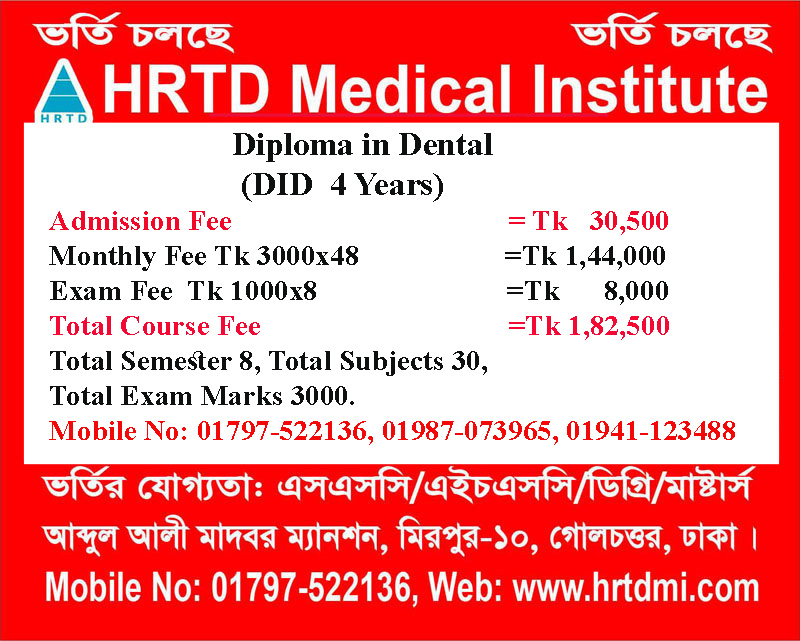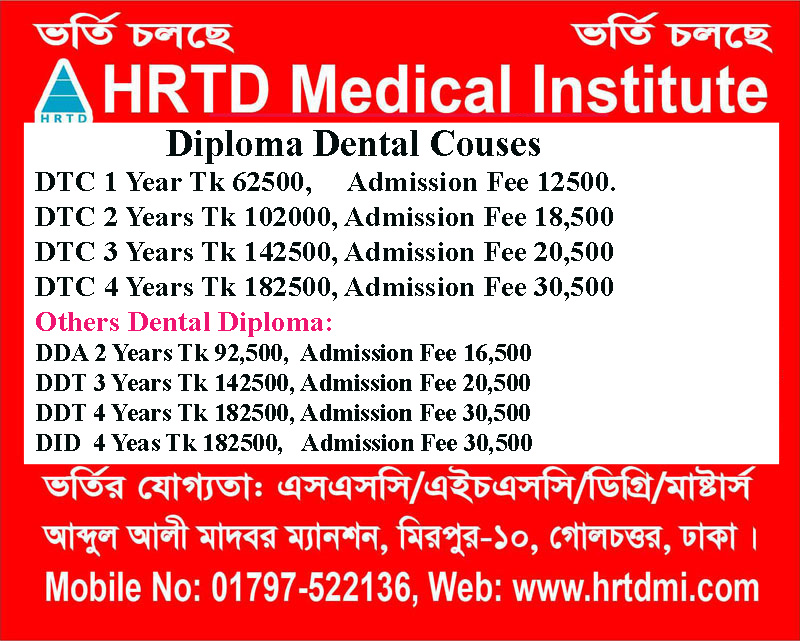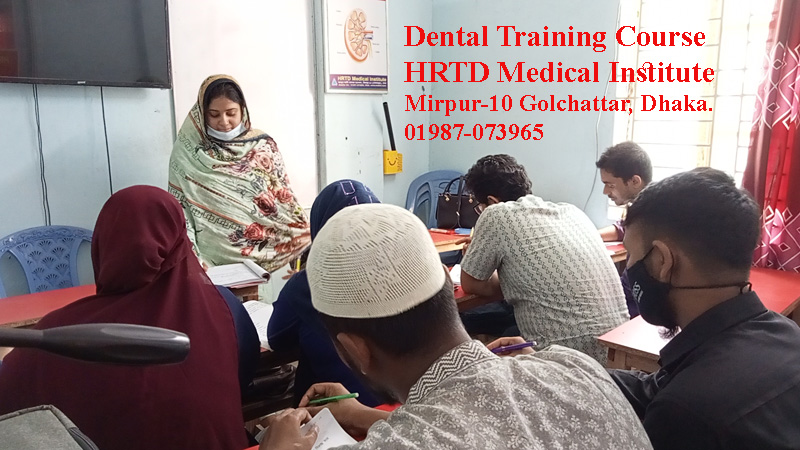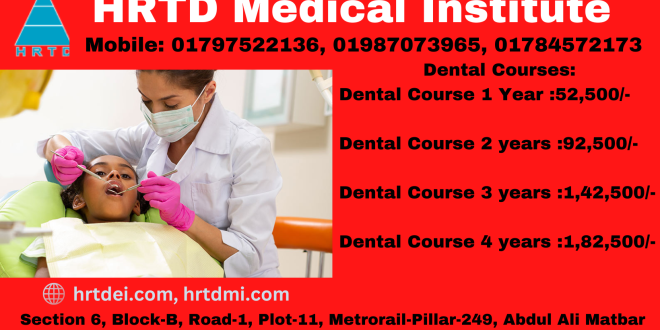Dental Training Institute Details
Dental Training Institute. Mobile Phone No: 01797522136, 01987073965. HRTD Medical Institute provides some dental courses. Our curriculum is popular with everyone. Our Diploma Dental Courses are well furnished. The 4-year dental diploma contains 8 semesters. 1st semester contains 5 subjects of 500 exam marks and 2nd semester also contains 5 subjects. 3rd semester contains 4 subjects and 4th semester also contains 4 subjects. Each of the rest of the other semesters contains 3 subjects. Total subjects 30.
HRTD Dental Training Institute provides Best Tuition Fee facilities:
Our payment system is very relaxed. At first, students should pay only the admission fee and then monthly fees every month. At the end of the semester, students should pay the exam fee.

Why HRTD is the Best Dental Training Institute?
HRTD Provides proper education and training for its dental students. We have the best practice facilities. Students can easily complete our dental courses and take a job in a dental chamber or he/she can start a chamber following the government’s rules. Every month we provide facilities for practical classes. HRTD is the best Dental Training Institute because we have short courses and Long Diploma Dental Training Courses. Students can transfer their courses from short courses to long courses and from long courses to short courses.

HRTD Dental Training Institute provides the Best Solutions of Dental Problems:
Dental problems are a common and often painful part of life. From cavities to gum disease, everyone experiences a dental issue at some point in their life. Fortunately, there are a variety of treatments available to help keep your teeth and gums healthy. Here are five of the most common dental problems and how to address them:
1. Cavities: Cavities are the most common dental problem, and they occur when bacteria in the mouth eat away at the enamel of the teeth. To prevent cavities, it’s important to practice good oral hygiene, including brushing and flossing every day and visiting your dentist regularly. Treatment for cavities includes fillings and, in more severe cases, root canals.
3. Tooth Decay: Tooth decay occurs when bacteria in the mouth cause the enamel of the tooth to break down. To prevent tooth decay, it’s important to practice good oral hygiene, including brushing and flossing every day and visiting your dentist regularly. Treatment for tooth decay includes fillings and, in more severe cases, root canals.
4.Tooth Sensitivity: it occurs when the enamel of the tooth breaks down, allowing the nerves and blood vessels to be exposed. To prevent tooth sensitivity, it’s important to practice good oral hygiene, including brushing and flossing every day and visiting your dentist regularly.
5. Bad Breath: Bad breath, also known as halitosis, is a common dental problem that can cause embarrassment and anxiety. To prevent bad breath, it’s important to practice good oral hygiene, including brushing and flossing every day and visiting your dentist regularly. Treatment for bad breath includes using mouthwashes, antibacterial gels, and, in more severe cases, antibacterial mouth rinses.
By understanding and addressing these five dental problems, you can keep your teeth and gums healthy. If you’re experiencing any of these problems, it’s important to visit your dentist as soon as possible. With the right treatment, you can have a healthy and happy smile.
Teachers for Dental Courses at HRTD Dental Training Institute
Dr. Sanjana Bine Ahmed, BDS, MPH, Dental Surgeon
Dr. Sakulur Rahman, MBBS, CCD
Dr. Amena Afroze Anu, MBBS, PGT
Dr. Nazmun Nahar Juthi, BDS, PGT, Dental Surgeon
Dr. Tisha, MBBS, PGT Medicine
Dr. Sharmin Sultana, MBBS, PGT
Dr. Kamrunnahar Keya, BDS, PGT, Dental Surgeon
Dr. Ziaul Kabir, BDS, Dental Surgeon
Subjects for Dental Courses at HRTD Dental Training Institute
Subjects for Dental Courses. Mobile Phone 01797522136, 01987073965. The subjects are Human Anatomy and Physiology, Pharmacology, Microbiology, Hematology, Antimicrobial Drugs, Dental Anatomy, Dental Physiology, Dental Pathology, Oral Pathology, Dental Surgery, Conservative Dentistry, etc.

Human Anatomy and Physiology for Dental Courses
HRTD Dental Training Institute. Mobile No. 01797522136, 01987073965. Human Anatomy and physiology are important subjects for the Dental Course. The study of Body Structure and its functions is Anatomy and Physiology. Here we discuss the systems of the Human Body and its Organs, Tissues, and Cells. The systems of the Human Body are the Nervous System, Digestive System, Respiratory System, Circulatory System or Cardiovascular System, Skeletal System, Muscular System, Endocrine System, Immune System, Lymphatic System, Integumentary System or Covering System, and Urinary System.
Pharmacology for Dental Courses at HRTD Dental Training Institute
The study of Drugs and Medicine is called Pharmacology. Drugs are chemicals that can react with cells, tissues, and body organs. Here we discuss group-wise drugs and their medicines. Common Groups of Drugs are Pain Killer Drugs, Anti Ulcer Drugs, Anti Vomiting Drugs, Anti Viral Drugs, Laxative Drugs, Motility Drugs and Antimotility Drugs, Bronchodilator Drugs, Antibiotic Drugs, Anti Fungal Drugs, Anti Thrombotic Drugs, Anti Protozoal Drugs, Anthelmintic Drugs, Anti Hypertensive Drugs, Beta Blocker Drugs, Calcium Channel Blocker Drugs, ACE Inhibitor Drugs, Hemostatic Drugs, Analgesic Drugs, Antipyretic Drugs, Steroid Drugs, NSAID Drugs, CNS Drugs, Neuropathic Pain Keller Drugs, Spasmodic Drugs, etc.
First Aid for Dental Courses at HRTD Dental Training Institute
First Aid is an important subject for all courses. It is important for the Dental Courses. Here we discuss Shock, Classifications of Shock, Causes of Shock, Stages of Shock, Clinical Features of Shock, Hypovolemic Shock, Cardiogenic Shock, Neurogenic Shock, Traumatic Shock, Burn Shock, Electric Shock, Psychogenic Shock, Anaphylactic Shock, First Aid of Shock, Management of Shock, First Aid of Cut, First of Snake Bite, First Aid of Accidental Injury, etc.
Study of OTC Drugs for Dental Courses at HRTD Dental Training Institute
OTC is the short form of over-the-counter. That is OTC Drugs are over-the-counter drugs. The study of OTC Drugs is important for RMP Courses. These Drugs can be sold or purchased without any prescription from Registered MBBS Doctors. These Drugs are Emergency and Safe for the patients. The study of OTC Drugs improves the quality of practice. Some OTC Drugs are Paracetamol, Albendazole, Ascorbic Acid, Calcium, Multivitamins, Vitamin B Complex, Omeprazole, Oral Rehydration Salt, Salbutamol, Mebendazole, Neomycin, Gentamycin, Bacitracin, etc.
Hematology and Pathology for Dental Course at HRTD Dental Training Institute
Hematology and Pathology are important subjects in medical science and Dental Science. The study of Blood is called Hematology and the Study of Pathos is called Pathology. In Hematology and Pathology, we discuss blood cells, their morphology and functions, Blood Diseases, Common Pathos and their pathogenesis, Atrophy, Hypertrophy, Metaplasia, Gangrene, Pathological Tests like TC, DC, ESR, Hemoglobin Percentage, etc.
Microbiology and Antimicrobial Drugs for Dental Courses
The Study of Microorganisms is called Microbiology. Microorganisms are the smallest living beings that cannot be seen without a microscope. The Drugs that are used for the treatment of Infectious Diseases are Antimicrobial Drugs. Microorganisms are Bacteria, Protozoa, Fungus, and Virus. Antimicrobial Drugs are Antibiotic Drugs ( Antibacterial Drugs), Anti Protozoal Drugs, Anti Fungal Drugs, and Anti Viral Drugs.
Practice of Medicine for Dental Courses
The study of Disease and Treatment is called the Practice of Medicine. Actually, the Practice of Medicine means the use of medicine for treatments. This subject is important for Dental Practitioners. This subject discusses some common diseases. The points of discussion for the Practice of Medicine are the Definition of Disease, Causes of Disease, Clinical Features of Disease ( Symptoms and Signs), Investigation of Disease, Treatment of Disease, Complication of Disease, and Advice for the Patients.
 HRTD Medical Institute
HRTD Medical Institute





